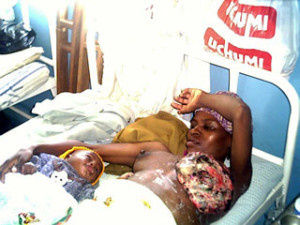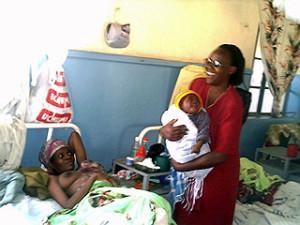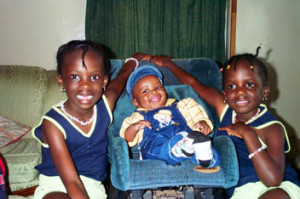Summary: Breast cancer in Sub-Saharan is rarely diagnosed until late stages, sometimes when nothing else can be done. Cancer Free Women reaches out to educate women in remote areas of developing countries through churches and local seminars. Breast cancer patients are often neglected and abandoned in hospitals and left to die with no one by their side. Supporting our mission could help one life like the one you are just about to read
Meet Lucy:
Lucy Ncororo, 40 years old with breast cancer, was a patient admitted at the Meru District Hospital in Kenya for six months. No family or friend ever came to see Lucy since she was admitted. Lucy was admitted at Meru Hospice on 18th August 2002 after general hospital concluded her fungating breast cancer was terminal. In hospice, Lucy got a chance to narrate her ordeal. There are thousand such stories in Kenya…read on and share.
She had been married for about 10 years but divorced because she could not bear children. After the divorce, Lucy moved to live in a rented house where she met a man and they became lovers. This didn’t last for long as the man was already married with three children (as she later discovered).
Breast cancer knocked Lucy’s door midst her already complicated life. When Lucy started ailing, her temporary lover advised her to go back home, which she did. Her parents and siblings took her to Meru General District hospital. This was the last time she ever saw or heard from her family. She was abandoned. Lucy lost contact with her temporary lover who evidently only needed her for the good times and not during fight against breast cancer. In many African cultures, breast cancer is seen as punishment from gods for being unfaithful to the husband.
Lucy was divorced by her 10 year husband because she could not bear children but during her admission, she was not aware that she was six months pregnant with her new lover’s child. She was shocked to learn of it later as she counted her last days in this world. On 21st May 2003, God blessed Lucy with a bouncing baby boy by the name Moses Ntungai (means Man of God). Lucy felt that the coming of Moses during the hardest times of her life was a show of God’s mercy and a gift to her since she had longed to carry a baby for many years.
 The happiness of finally having a son was short-lived. Lucy’s fungating breast mass was growing bigger and bigger by the day. Her pain and suffering was becoming more and more intolerable. The mass became infected and need surgery though her health condition could not have allowed it. She could not have survived a surgery, if there was one available. Lucy was abandoned by her friends, family and lovers to die in the hospital. Meru Hospice was her new home. Doctors could not operate on her. Knowledge and resources were not there.
The happiness of finally having a son was short-lived. Lucy’s fungating breast mass was growing bigger and bigger by the day. Her pain and suffering was becoming more and more intolerable. The mass became infected and need surgery though her health condition could not have allowed it. She could not have survived a surgery, if there was one available. Lucy was abandoned by her friends, family and lovers to die in the hospital. Meru Hospice was her new home. Doctors could not operate on her. Knowledge and resources were not there.
Meru hospice staff found that she and her baby had no clothes at all. She had no energy to feed her very young baby boy who laid beside her completely oblivious of what was going on. Meru General Hospital staff tried their best to ensure that they were comfortable but with little success due to lack of financial resources and personnel. Meru Hospice decided to shoulder her burden free of charge and provide her with whatever she needed. Her pain continued to become too excruciating as she fought hard away from death that was imminent. She needed high doses of morphine and other drugs, wound dressing material for the wound and clothes. The hospice bought clothes and toys for her ever-smiling baby.
Lucy’s health was deteriorating as days went by. With the help of hospice staff, Lucy was emotionally and spiritually in terms with her condition and what lied ahead. Lucy, despite all what’s surrounded her had a reason to reason to smile.
 Baby Moses at 5 months old and was doing really well; he was looking bright and healthy. But it was becoming progressively difficult for Lucy to take care of him. No relative ever came to visit her. She is abandoned to die alone. She depends on relatives of neighboring patients to assist her wash her clothes, change and feed her baby.
Baby Moses at 5 months old and was doing really well; he was looking bright and healthy. But it was becoming progressively difficult for Lucy to take care of him. No relative ever came to visit her. She is abandoned to die alone. She depends on relatives of neighboring patients to assist her wash her clothes, change and feed her baby.
Meru Hospice took a further step and asked her if she wanted her son to be adopted. Lucy welcomed the idea with great relief since she had been thinking a lot about it. Moses now has a new home.
Another thorny issue was the question of her burial. Lucy’s relatives were certainly not going to come and bury her if they had not come to see her during her fight with fungating breast cancer. They probably feared being left with the responsibility of taking care of baby Moses. Usually, abandoned patients who die at the District hospitals are buried in mass graves. Lucy asked the hospice not to allow this to happen to her. The hospice made arrangements to oversee her burial and gave her the dignity she deserved.
Rest in Peace Lucy.
Help fight breast cancer in Africa

Lucy’s son finally got adopted. For more information about Lucy’s Son Noses, contact us if you would like to reach out and help
Help Fight Breast cancer
Story adapted from Here



